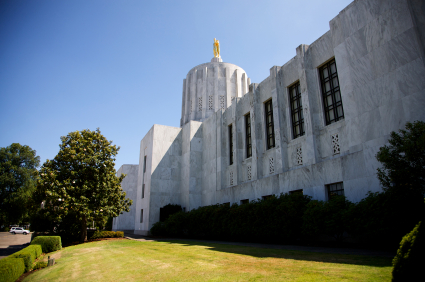Capitol Round-up: Business Tax, Hemp, Wolf, Carbon

SB 1528Small business tax. SB 1528 is a tax only on Oregon Small businesses which will impact many small Oregon family farmers. Last year Congress passed the heralded Tax Reform package which provided small businesses a 20% reduction in taxable income. SB 1528 simply steals away the benefit from Oregon taxes. Sb 1528 only eliminates the tax deduction for small businesses in the 2017 Tax Reform and does not eliminate or touch the tax reductions offered to large corporations.
HB 4089 Hemp Bill: Legalization of marijuana is all the rage across the country, but the “industrial” side – production of non-smokable hemp for rope, clothes and paper – gets much less attention. While the commercial viability of hemp is in question, federal law currently prohibits its being grown as a crop, even for these benign uses. House Bill 4089, as passed by the Committee, amends Oregon law to comply with requirements of the federal government before research can be conducted into hemp as a crop.
HB 4106 Wolf Bill: The tug-of-war over reintroduction of wolves into the West also received a nod from the Agriculture Committee. House Bill 4106 would, for the first time, acknowledge a direct relationship between the wolf population and the amount of money needed to reimburse ranchers for livestock killed by wolves and on-going efforts to prevent such depredation. Each biennium, the State Department of Fish and Wildlife will report an estimate of the State’s wolf population, and the Legislature will consider increasing (or decreasing) the amount provided to Counties to deal with the problems created. The bill does not require the Legislature to provide additional funding.
HB 4109 Carbon Bill: House Bill 4109 provides an expansion of the State’s interests in the impact of carbon dioxide on the Earth’s atmosphere and climate. It directs the State Departments of Environmental Quality and Forestry to conduct a study of potential State actions that would promote carbon sequestration, and further to look at possible regional approaches to reach carbon sequestration goals. These actions could be used in place of assigning penalties to producers of CO2, most likely to be paid by energy consumers and taxpayers.
SB 1507 Carbon cap-and-tax: This tax on businesses taht exceeds emission limits has had a public hearing but no votes as of yet.
The current Legislative Session will continue until mid-March.
Posted: February 21st, 2018 under Uncategorized.

 Subscribe To RSS
Subscribe To RSS